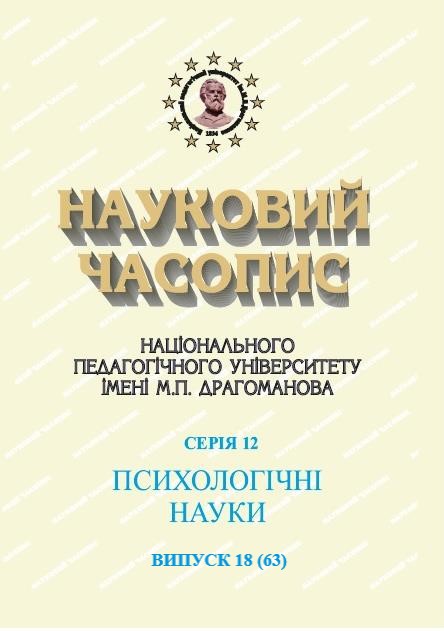GENDER FEATURES OF COMMUNICATIVE TOLERANCE MANIFESTATION OF MODERN YOUTH
DOI:
https://doi.org/10.31392/NPU-nc.series12.2021.18(63).05Keywords:
tolerance, communicative tolerance, gender identity, masculinity, androgyny, femininity.Abstract
The article considers the issue of communicative tolerance and gender differences in its manifestation in adolescence. As this age period is determined by significant changes in the social and personal development of young people, communication is the dominant element of their adaptation to such transformations. Compatibility or incompatibility of the same qualities between the partners plays a crucial role in the mechanism of formation and manifestation of communicative tolerance. However, gender qualities of personality, in particular gender identity, are not only important qualities that affect the intensity and quality of communication. The purpose of the article is to theoretically analyze and empirically study the level of communicative tolerance and gender characteristics of adolescents, as well as to identify the relationship between them. Theoretical analysis of the stated issues showed that despite the scientists’ close attention to the problem of communicative tolerance of different sexes, no work on its study in adolescence from the standpoint of gender (masculinity, femininity, androgyny) has been found. The following methods were used to conduct the research: theoretical (analysis, synthesis and generalization of the latest research sciences of this problem); empirical “Questionnaire of communicative tolerance” (author V.V. Boyko) and Sandra Bem’s questionnaire “Diagnosis of psychological sex”. Besides, the method of statistical analysis, Pearson’s correlation analysis was used. Empirical data have shown that the majority of young adolescents have a desire for favorable and effective communication, understanding with opponents, they are socially active and do not avoid joint activities with others, however, due to limited abilities and skills, sometimes they are unable to organize effective communicative activities based on partnership relations, show “flexibility” in communication depending on the individual characteristics of others. We also found that most young people have masculine and androgynous personality traits. Analysis of the relationship between the gender qualities of the individual with the level of their communicative tolerance showed that masculine individuals tend to have intolerant communication tendencies more often than feminine and androgynous individuals do.
Referencеs
- Bantysheva, O.O. (2016). Henderno-vikovi osoblyvosti skhylnosti osib yunatskoho viku do aktyvnoi povedinky [Gender and age characteristics of adolescents’ propensity to active behavior]. Molodyi vchenyi – The Young Scientist,1(28), 58–63 [in Ukrainian].
- Barandova, T.L. (2007). Osnovy tolerantnosty v hendernoi perspektyve. Tolerantnost: vvedenye v poniatye. Uchebnoe posobye [Fundamentals of tolerance in a gender perspective. Tolerance: an introduction to the concept. Textbook]. In A.Yu. Sungurov (Ed.). Saint Petersburg : Yzd-vo Yutas [in Russian].
- Boiko, V.V. (1994). Kommunykatyvnaia tolerantnost v mezhlychnostnykh otnoshenyiakh [Communicative tolerance in interpersonal relationships.]. Obozrenye psykhyatryy y medytsynskoi psykholohyy im. V.M. Bekhtereva – Review of psychiatry and medical psychology. V.M. Bekhtereva, 1,13–21[in Russian].
- Voropaieva, T.S. (2010). Transformatsiia hendernoi identychnosti v Ukraini. Osobystisni vymiry stanovlennia novoi paradyhmy suchasnoi ukrainskoi osvity [Transformation of gender identity in Ukraine]. In T.I. Vlasovoi & T.M. Talko (Eds.). Osobystisni vymiry stanovlennya novoyi paradyhmy suchasnoyi ukrayinskoyi osvity – Personal dimensions of the formation of a new paradigm of modern Ukrainian education (pp. 150–158). Dnipropetrovsk : Vyd-vo Makovetskyi [in Ukrainian].
- Hlynska, L., & Skliarov, R. (2019). Fenomen tolerantnosti v sotsialno-filosofskykh interpretatsiiakh [The phenomenon of tolerance in socio-philosophical interpretations]. Sotsiolohichni studii – Sociological Studies, 2(15), 42–44. https://doi.org/10.29038/2306-3971-2019-02-42-47 [in Ukrainian].
- Hrynshpun, Y.B. (2003). Poniatye y soderzhatelnie kharakterystyky tolerantnosty [The concept and content characteristics of tolerance]. Tolerantnoe soznanye y formyrovanye tolerantnikh otnoshenyi (teoryia y praktyka): sbornyk nauchno-metodycheskykh ststatei – Tolerant consciousness and the formation of tolerant relations (theory and practice): a collection of scientific and methodological articles (2nd ed., pp. 31–40). Moscow : MPSY; Voronezh : NPO «MODЭK» [in Russian].
- Kondratiuk, A.Iu., & Lytvynenko, S.A. (2014). Henderni vidminnosti samorealizatsii osobystosti v yunatskomu vitsi [Gender differences in self-realization of the individual in adolescence.]. Psykholohiia: realnist i perspektyvy. Zbirnyk naukovykh prats RDHU – Psychology: reality and prospects. Collection of scientific works of RDGU, 3, 73–75 [in Ukrainian].
- Kuzmenko, R. (2019). Fenomen tolerantnosti yak konsoliduiuchyi faktor v liudskykh vidnosynakh [The phenomenon of tolerance as a consolidating factor in human relations.]. Materialy zvitnoi naukovo- praktychnoi konferentsii vykladachiv, doktorantiv ta aspirantiv fakultetu filosofii ta suspilstvoznavstva. Yednist navchannia i naukovykh doslidzhen – holovnyi pryntsyp universytetu – Proceedings of the reporting scientific-practical conference of teachers, doctoral students and graduate students of the Faculty of Philosophy and Social Sciences. Unity of teaching and research - the main principle of the university (May 13-17), 66–68 . Kyiv : Vyd-vo imeni M.P. Drahomanova [in Ukrainian].
- Spivak, L.M. (2012). Psykholohichni peredumovy stanovlennia samosvidomosti osobystosti v yunosti [Psychological prerequisites for the formation of self-awareness of the individual in adolescence]. Naukovyi visnyk Chernivetskoho universytetu. Pedahohika ta psykholohiia – Scientific Bulletin of Chernivtsi University. Pedagogy and Psychology, 627, 141–149. [in Ukrainian].
- Vovk, Yu., & Vovk, L. (2018). The structure of the gender culture of junior schoolchildren. Liudynoznavchi studii. Zbirnyk naukovykh prats DDPU imeni Ivana Franka. Seriia: Pedahohika - Human studies. Collection of scientific works of Ivan Franko DSPU. Series: Pedagogy, 6(38), 84–95. https://doi.org/10.24919/2313-2094.6/38.121429 [in Ukrainian].
- Storozhuk,,& Hoian, I. (2017). Gender equality as a modern phenomenon. Anthropological Measurements of Philosophical Research, 11, 71–83. https://doi.org/10.15802/ampr.v0i11.105481

